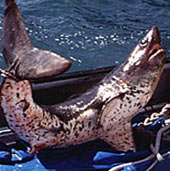Hot blood shark detected
 Salmon sharks in the Alaskan Gulf are cold with the same muscular bundles - with conspicuous reds due to blood vessels - similar to mammals: they release and warm the animal's body to 26 degrees Celsius, higher 20 degrees above the surrounding water temperature .
Salmon sharks in the Alaskan Gulf are cold with the same muscular bundles - with conspicuous reds due to blood vessels - similar to mammals: they release and warm the animal's body to 26 degrees Celsius, higher 20 degrees above the surrounding water temperature .
But surprisingly, when the red muscle bundle was tested under laboratory conditions, it did not work at low temperatures. That means salmon sharks have to maintain a high temperature in the center of the body all the time, allowing it to swim at any speed.
" We did not expect this, " shark metabolic researcher Robert Shadwick from the University of British Columbia in Vancouver (Canada) said.
Most fish species, including sharks, have only " white muscle bundles " that work at temperatures equal to the surrounding water temperature. The most likely benefit (but not yet proven) of maintaining warm muscle bundles is to help hunters get greater speed and agility, plus the freedom to swim in cold water. than their cold-blooded prey, Robert Shadwick analyzed.
Salmon salmon can weigh up to 160 kg. As an agile carnivore, they evolved body shape and even a fin shaped like a bluefin tuna - a large carnivore that lives in cold, aggressive and hot water. In fact, it is the similarity of lifestyle and physical characteristics of these two species that led Shadwick and his colleagues to find out whether salmon sharks have a mechanism to " warm up " the body inside the tuna or breed. is not. And they found that.
The big difference between these two species is that the red muscle bundle of tuna can work right at low temperatures, while the red inner muscle bundle of salmon sharks (surrounded by white muscle bundles) needs heat to work.
And that makes the shark's muscles resemble surprising animals. Muscle and most organs in most mammals have evolved to function only within a narrow range of high temperatures.
" The ability to raise body temperature in sharks is very unusual, " said Kathy Dickson, a researcher on shark metabolism at Fullerton University, California.
T. An ( according to Discovery )
- Warning of fake shark microbes, made of plastic
- Video: Sharks' sudden reaction when lured with human blood
- Big sharks eat small sharks
- The first shark in history to know ... vegetarian but still healthy
- Catch sharks from prehistoric times
- Install a super-sensitive camera on the shark's body
- Catch a shark with a body like a snake, a mouth of 300 teeth
- The first 'vegetarian' shark in the world
- Introduce the shark shark bracelet
- The killer shark species of the ocean
- Robot hits the shark
- Catch a shark with two heads
 Animal 'suffering' after hibernation
Animal 'suffering' after hibernation Why do goats climb well?
Why do goats climb well? Scientists were surprised to see chimpanzees eating turtles
Scientists were surprised to see chimpanzees eating turtles Giant catfish died deadly due to drought in Thailand
Giant catfish died deadly due to drought in Thailand